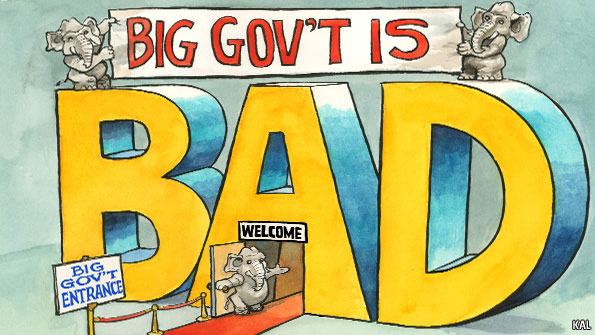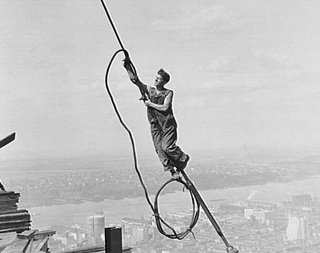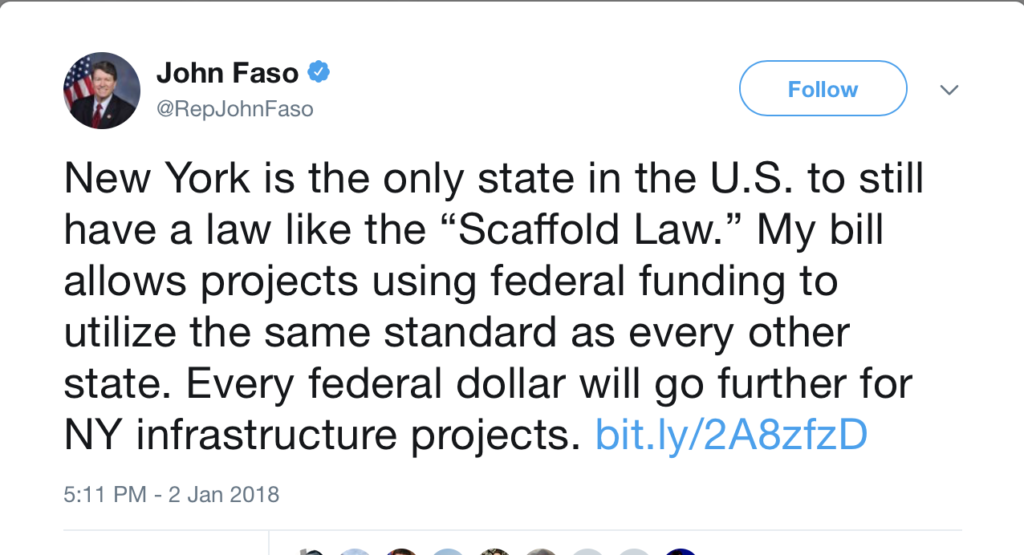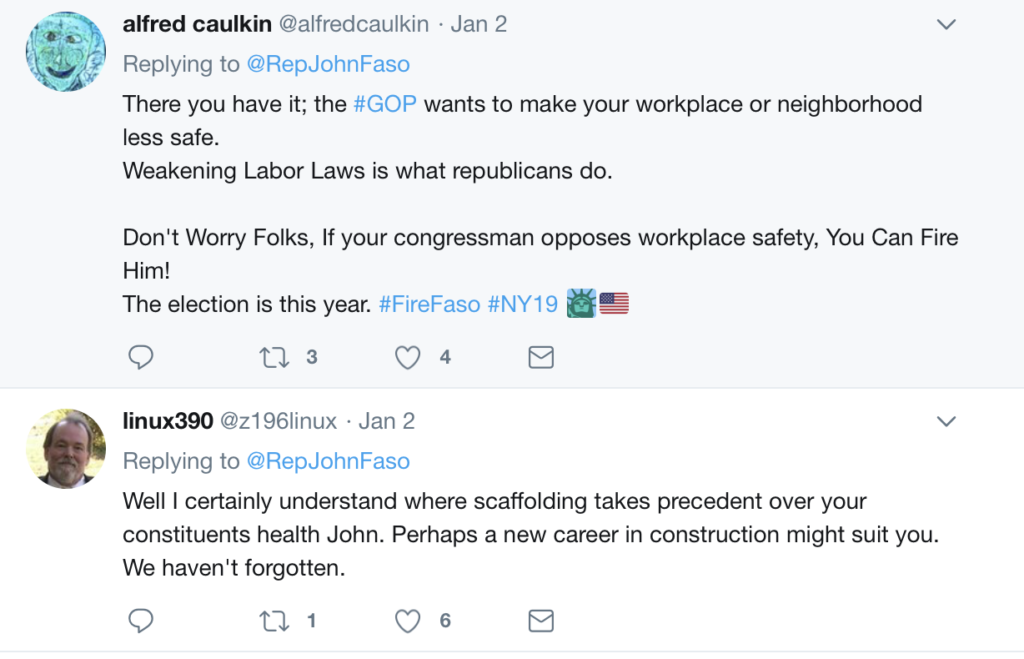 It’s remarkable, really, to see the same act play out over and over again. Certain members (not all) of the Republican Party bellow, bawl and otherwise howl that the federal government should be limited. OK, I get it.
It’s remarkable, really, to see the same act play out over and over again. Certain members (not all) of the Republican Party bellow, bawl and otherwise howl that the federal government should be limited. OK, I get it.
Except, however, when they decide otherwise. “Meh, who needs it? We’ll flip-flop today and just flippity-flop right back again tomorrow.” So say certain Republicans.
I’m spurred to write because some members of the GOP — the federal flavor — are in an all-out assault on a 130-year-old New York law that protects New York construction workers in the State of New York. The issue is our Scaffold Safety Law (Labor Law 240) which is very much a state issue.
You may agree with New York’s public policy or disagree. No matter. States are the laboratories of democracy. This is our rationale:
The Scaffold Safety Law protects workers at heights. If the construction company fails to provide required safety devices and the worker is hurt or killed, the company is liable.

The law dates to 1885 and has been a boon to the health and lives of New York’s bluest of blue collar workers who have worked at dizzying heights in the most dangerous of conditions. I first wrote about this 10 years ago: New York Labor Law Protects Workers, And Should Not Be Diminished
Makes sense, right? It’s the company that controls the workplace, after all.
And if the safety equipment is provided and the worker ignores it? Well, then the company is off the hook. And if the worker comes back from lunch bombed out of his skull and is solely responsible for getting hurt, well, then it’s also on that worker.
Did you see that word “solely?” There is no comparative negligence for this Labor Law violation. It’s all or nothing. One way or the other.
New York construction companies don’t like the Scaffold Safety Law, claiming that they want to be able to blame the worker for part of the accident, even if they failed to provide the proper safety equipment. But since the company controls not only the workplace but all the witnesses too — who wants to risk losing their job by testifying against the boss? — the rule is absolute.
New York’s construction companies have routinely failed to convince the New York Legislature to change the law because the current law makes perfect sense to others (and construction in New York has, quite obviously, flourished during its time).
This is a state-wide public policy decision that’s been oft-debated in Albany and New Yorkers have decided that it works. If another state doesn’t like it, so be it. As Justice Louis Brandeis who once wrote, a “state may, if its citizens choose, serve as a laboratory; and try novel social and economic experiments without risk to the rest of the country.”
And New York has chosen to be that state-wide laboratory for worker safety.
Construction companies have belly-ached to our Legislature about insurance premiums, but they don’t want to release the data for how the premiums are calculated. They don’t segregate out, for example, injuries from height-related accidents that are covered under the law from injuries related to getting hit by a car on the work site that are not. Every year there is a bill in the New York State Legislature directly on this point, the Scaffold Sunshine Law, which would require disclosure of the real basis for insurance premiums. Guess who objects to it? Yeah. The construction companies and their insurers. It’s absurd to whine about insurance premiums when no one can see the books.
Many of these dangerous construction jobs are taken by folks who live paycheck-to-paycheck, and feeding the family is Job One. Oddly enough, their first priority is not walking into court to testify against the boss that the ladder the boss provided was old and busted, and that he told the workers they damn well better use it or go home.
No. Feed the kids, pay the rent, and if Juan got hurt due to that busted ladder, well, maybe those other workers didn’t really see that busted ladder all that well. Assuming they are still employed. Protect thyself. And thy family.
That is the state rationale for doing it this way.
So — and stay with me here because this is the point of the post — having failed in Albany to change a New York law based on New York public policy concerns, and not wanting to open up their books so others could see if their insurance argument actually had any merit, what do the construction companies do? HOWL TO WASHINGTON: HELP!!! HELP!!! HELP!!!
Yes, that’s right, they’ve convinced some Republicans in Washington to engage in a federal power grab over New York construction and New York policy considerations. I shit you not. And it’s only for New York.
The bill is H.R.3808, with the misnomer Infrastructure Expansion Act, sponsored by New York Congressman John Faso (@RepJohnFaso), whose district covers the Catskills. The bill should properly be called the #FederalPowerGrabAct. And that’s what I’ll call it, because that’s what it is. So now it has a proper name.
And Faso couldn’t be more blunt on the usurpation of state power with the #FederalPowerGrabAct. Faso simply admits it in the bill’s description:
To preclude absolute liability in any action against a property owner or contractor for projects receiving Federal financial assistance for infrastructure and transportation development, and for other purposes.
And he says so on Twitter, that this is only a New York issue:
His own constituents were not kind to him in response:
So the question is, will the GOP pass a bill that simply targets the policy decisions of a particular state?
We’ve seen this act play out before. And it often comes in the context of tort “reform” wherein the reform isn’t actually reform but, rather, interceding into state issues to engage in liability protectionism for big companies that cause injuries.
Back in 2005 a Republican Congress and Republican President tossed their limited government principles aside to pass the Graves Amendment, which impacted liability for car rental and leasing companies. They didn’t like New York law and policy, so the GOP simply seize more power for Washington.
And last year the Republican Party tried to federalize medical malpractice law, and is still trying. If you don’t like local law, then simply expand federal power.
Apparently, limited government is all-important. Except on those days when you decide limited government is for losers.
This bill is scheduled for a vote in the House Judiciary Committee on Tuesday. The other Republican sponsors — and the #FederalPowerGrabAct only has Republican sponsors, only from New York, asking for federal intervention on this New York law — are Chris Collins, Elise Stefanik, Claudia Tenney and Tom Reed.
The chairman of the committee is Bob Goodlatte, who has long campaigned on the issue of states rights. Such as this: House Passes Goodlatte Amendment to Prevent EPA Power Grabs
And this: Goodlatte Files Amicus Brief on Chesapeake Bay Case
Chairman Goodlatte: “EPA’s power grab surrounding the Chesapeake Bay TMDL sets a dangerous precedent by usurping authority delegated to the states in the Clean Water Act simply because the agency disagrees with a state’s decision on implementation.
And check out this summary of Goodlatte’s staunch support for all manner of states rights: Bob Goodlatte: A Consistent Champion of the Tenth Amendment
And this opinion piece from Daniel Horowitz in the Washington Times:
A core tenet of constitutional conservatives and libertarians — is the understanding that all power does not and must not rest solely in the hands of the federal government. Most Americans understand there must be a balance of powers between Congress, the presidency and the judiciary. Just as the Constitution established checks and balances between branches of the federal government, the 10th Amendment established a similar balance — reserving all powers to the states that were not delegated by the Constitution.
As a Virginian and a conservative, I’m proud of the manner in which the chairman of the House Judiciary Committee, Republican Rep. Bob Goodlatte of Virginia, has regularly defended the 10th Amendment. Throughout his career, Mr. Goodlatte has been a staunch and consistent advocated for federalism and a protector of the 10th Amendment.
Will Goodlatte permit the #FederalPowerGrabAct to get out of his committee? Will he try to substitute federal judgment for New York judgment that has been around for 130 years?
We find out Tuesday. And if you want Goodlatte to know you are watching well, his Twitter handle is @RepGoodlatte.
Will your Congress member be one of the ones that will attempt the federal power grab? The list is here.



